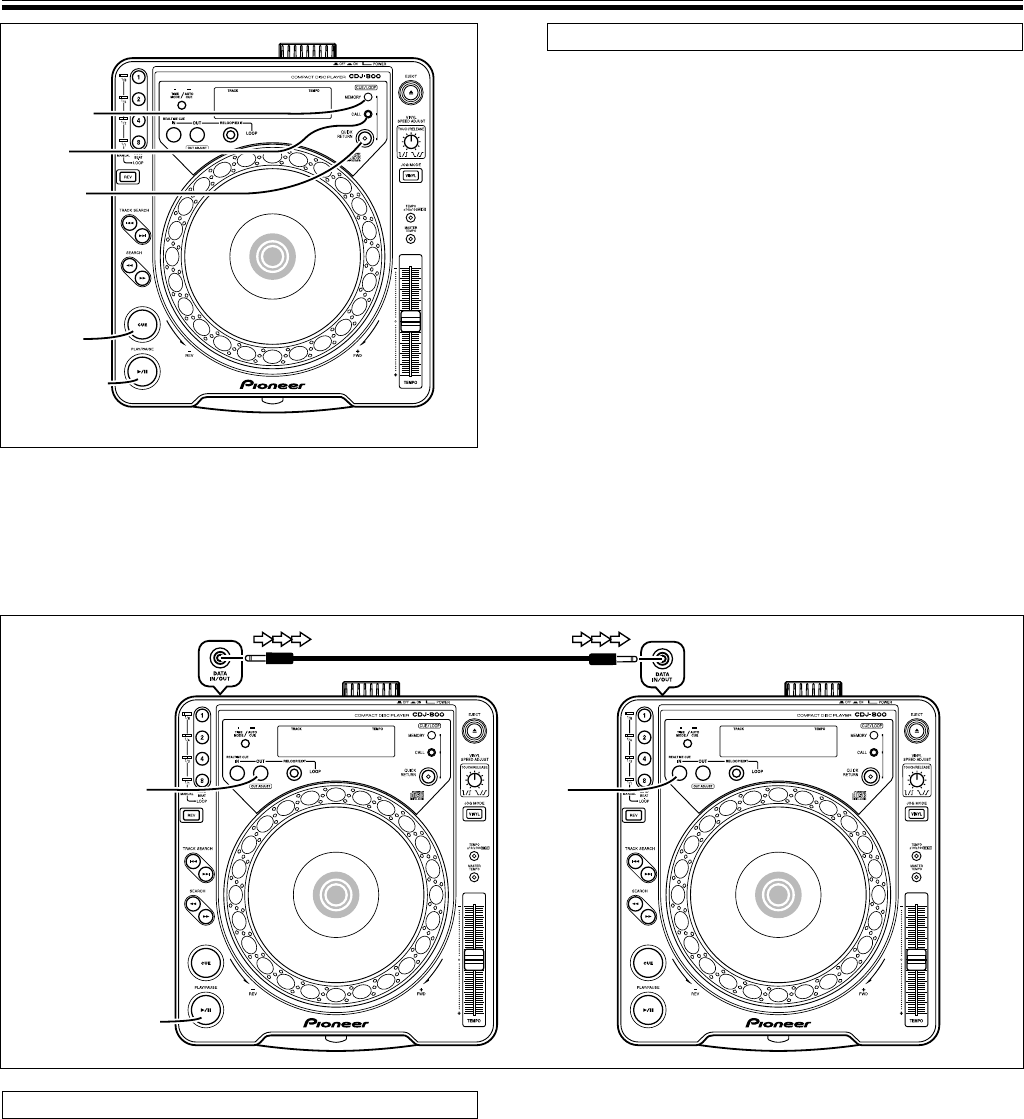
16
<DRB1333>
En
Cue Point / Loop Point Memory
This component is equipped with an internal memory allowing cue or loop points
to be recorded for each disc. The internal memory allows one cue or loop point to
be recorded for a total of up to 500 discs. If more than 500 cue or loop points are
input, earlier data will be erased, beginning with the most infrequently used data.
7 Storing Cue points
1. Enter Cue points using the A. CUE function or the CUE
button.
2. Press the CUE/LOOP MEMORY button.
÷ [MEMO] is shown in the display indicating that the Cue point has been
stored.
7 Storing Loop points
1. Enter the Loop in/out points to perform loop playback.
2. Press the CUE/LOOP MEMORY button during loop
playback.
÷ [MEMO] is shown in the display indicating that the Loop in/out points
have been stored.
7 Calling stored Cue/Loop points
1. Press the CUE/LOOP CALL button.
÷ The [CALL] indicator will light in the display, the selected Cue/Loop point
will be accessed, and the player will pause at the Cue/Loop in point.
2. Press the PLAY/PAUSE button (6).
÷ Play or loop play starts.
ADVANCED OPERATIONS
LOOP OUT
(OUT ADJUST)
LOOP IN/
REALTIME
CUE
PLAY/PAUSE
6
CUE/LOOP
MEMORY
CUE/LOOP
CALL
QUICK
RETURN
CUE
PLAY/PAUSE
6
Copying Recorded Data to Another Player
Cue and loop-point data recorded in one player can be copied to another player.
1. Use a mini plug cord to connect the DATA IN/OUT
connectors of two CDJ-800 players (without loaded
CDs).
÷ The supplied control cord can be used.
2. Press the LOOP OUT (OUT ADJUST) button on the
sending player for five seconds or more.
÷ The sending player’s LOOP OUT (OUT ADJUST) button will light, and
the [COPY] message will appear in the display, indicating the data trans-
mission mode has been selected.
÷ The BPM display will show the number of discs recorded in the player.
3. Press the LOOP IN/REALTIME CUE button on the
receiving player for five seconds or more.
÷ The receiving player’s LOOP IN/REALTIME CUE button will light, and
the [COPY] message will appear in the display, indicating the data recep-
tion mode has been selected.
4. Press the PLAY/PAUSE button (6) on the sending
player.
÷ The sending player’s PLAY/PAUSE button [6] indicator will flash, and
the contents of the sending player’s memory will be transmitted to the
memory of the receiving player (any previous memory contents of the re-
ceiving player will be overwritten).
÷ When the copying is completed, the [End] message will appear in both
players’ displays, and the players will return to normal operation mode.
* If the [Err] message appears in one of the displays, the memory
data has not been copied properly. Turn the power to both
players OFF and then ON again, and repeat the copying proce-
dure from step 1.
* If the sending player is disconnected or not connected prop-
erly, the LOOP OUT (OUT ADJUST) button will flash quickly. If
the receiving player is disconnected or not connected prop-
erly, the LOOP IN/REALTIME CUE button will flash rapidly.
* Data on the receiving player is overwritten by the data from
the sending player; this means that any previously existing
data on the receiving player will be completely lost.


















